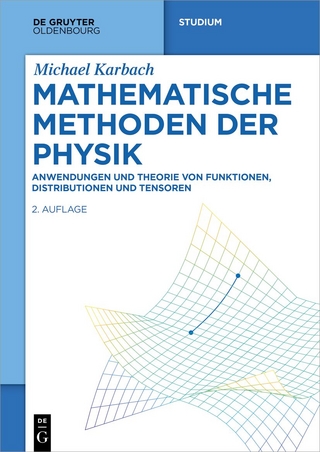
Analysis and Purification Methods in Combinatorial Chemistry
Wiley-Interscience (Verlag)
978-0-471-26929-8 (ISBN)
Quality measurement, control, and improvement in combinatorial chemistry
Combinatorial chemistry has developed rapidly in the past decade, with great advances made by scientists working on analysis and purification of a large number of compounds and the analysis of polymer-bound compounds. However, formidable challenges lie ahead of today's researcher. For example, high-throughput analysis and purification technologies must be further developed to ensure combinatorial libraries are "purifiable," and "drugable."
To this end, Analysis and Purification Methods in Combinatorial Chemistry describes various analytical techniques and systems for the development, validation, quality control, purification, and physicochemical testing of combinatorial libraries. A new volume in Wiley's Chemical Analysis series, this text has four parts covering:
* Various approaches to monitoring reactions on solid support and optimizing reactions for library synthesis
* High-throughput analytical methods used to analyze the quality of libraries
* High-throughput purification techniques
* Analytical methods applied in post-synthesis and post-purification stages
Drawing from the contributions of respected experts in combinatorial chemistry, this comprehensive book provides coverage of applications of Nuclear Magnetic Resonance (NMR), liquid chromatography/mass spectrometry (LC/MS), Fourier Transform Infrared (FTIR), micellar electrokinetic chromatography (MEKC) technologies, as well as other analytical techniques.
This eminently useful volume is an essential addition to the library of students and researchers studying or working in analytical chemistry, combinatorial chemistry, medicinal chemistry, organic chemistry, biotechnology, biochemistry, or biophysics.
BING YAN, PhD, was born in China and received his PhD in chemistry at Columbia University in 1990. He then worked at Cambridge University and the University of Texas-Houston Medical School as a postdoctoral fellow. From 1993 to 1999, he worked for Novartis in the Core Technologies area of preclinical research in New Jersey. He is currently at the Discovery Chemistry division of Discovery Partners International, Inc., in San Francisco. His major research interests are drug discovery, optimization of solid-phase and solution-phase combinatorial synthesis, high-throughput quantitative and qualitative analysis, and high-throughput purification of combinatorial libraries. He has written four books and published over seventy reviews and research articles.
Preface. Contributors.
PART I: ANALYSIS FOR FEASIBILITY AND OPTIMIZATION OF LIBRARY SYNTHESIS.
Chapter 1. Quantitative Analysis in Organic Synthesis with NMR (L. Lucas & C. Larive).
Chapter 2. 19F Gel-phase NMR Spectroscopy for Reaction Monitoring and Quantification of Resin Loading (J. Salvino).
Chapter 3. The Application of Single-Bead FTIR and Color Test for Reaction Monitoring and Building Block Validation in Combinatorial Library Sysnthesis(J. Cournoyer, et al.).
Chapter 4. HR-MAS NMR Analysis of Compounds Attached to Polymer Supports (M. Guinó & Y. de Miguel).
Chapter 5. Multivariate Tools for Real-Time Monitoring and Optimization of Combinatorial Materials and Process Conditions (R. Potyrailo, et al.).
Chapter 6. Mass Spectrometry and Soluble Polymeric Supports (C. Enjalbal, et al.).
PART II: HIGH-THROUGHPUT ANALYSIS FOR LIBRARY QUALITY CONTROL.
Chapter 7. High-Throughput NMR Techniques for Combinatorial Chemical Library Analysis (T. Hou & D. Raftery).
Chapter 8. Micellar Electrokinetic Chromatography as a Tool for Combinatorial Chemistry Analysis: Theory and Applications (P. Simms).
Chapter 9. Characterization of Split-Pool Encoded Combinatorial Libraries (J. Zhang & W. Fitch).
PART III: HIGH-THROUGHPUT PURIFICATION TO IMPROVE LIBRARY QUALITY.
Cha pter 10. Strategies and Methods for Purifying Organic Compounds and Combinatorial Libraries (J. Zhao, et al.).
Chapter 11. HTP of Combinatorial Chemistry Libraries (J. Hochlowski).
Chapter 12. Practical HPLC in High Throughput Analysis and Purification (H. Gumm & R. God).
PART IV: ANALYSIS FOR COMPOUND STABILITY AND DRUGABILITY.
Chapter 13. Organic Compound Stability in Large, Diverse Phatmaceutical Screening Collection (K. Morand & X. Cheng).
Chapter 14. Quartz Crystal Microbalance in Biomolecular Recognition (M. Tseng, et al.).
Chapter 15. High-Throughput Physicochemical Profiling: Potential and Limitations (B. Faller).
Chapter 16. Solubility in the Design of Combinatorial Libraries (C. Lipinski).
Chapter 17. High-Throughput Determination of Log D Values by LC/MS Method (J. Villena, et al.).
Index.
| Erscheint lt. Verlag | 9.1.2004 |
|---|---|
| Reihe/Serie | Chemical Analysis |
| Zusatzinfo | Charts: 61 B&W, 0 Color; Photos: 13 B&W, 0 Color; Drawings: 20 B&W, 0 Color; Screen captures: 15 B&W, 0 Color; Tables: 38 B&W, 0 Color; Graphs: 107 B&W, 0 Color |
| Sprache | englisch |
| Maße | 159 x 238 mm |
| Gewicht | 751 g |
| Themenwelt | Mathematik / Informatik ► Mathematik ► Angewandte Mathematik |
| Mathematik / Informatik ► Mathematik ► Graphentheorie | |
| Naturwissenschaften ► Chemie ► Analytische Chemie | |
| ISBN-10 | 0-471-26929-8 / 0471269298 |
| ISBN-13 | 978-0-471-26929-8 / 9780471269298 |
| Zustand | Neuware |
| Haben Sie eine Frage zum Produkt? |
aus dem Bereich


